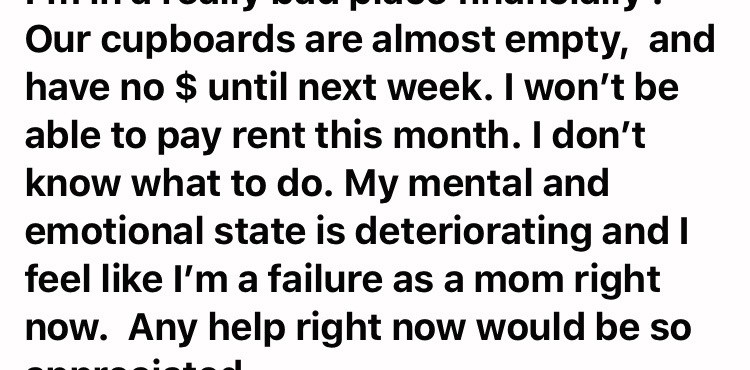The stories are heart-breaking – a single mom, or a pregnant woman, couch surfing, she has left an abusive relationship, is struggling during the COVID-19 pandemic – and they draw on the heartstrings of well-meaning people.
Unfortunately, this narrative has surfaced as a plotline in a scam to elicit money from those trying to help others during this time of crisis.
Ainslie Cook, one of the administrators with the Coming Together Richmond COVID-19 Facebook group, said they have had one confirmed such incident in their group, but she’s been seeing the same sob story, with many of the same details, posted on other local group pages over the past 10 days.
Cook said it’s “incredibly frustrating and infuriating” – given there are people in genuinely unsafe situations and domestic abuse is on the rise – that some people are taking advantage of the heightened societal concern and outpouring of generosity that has manifested during the COVID-19 pandemic.
She is worried people will become skeptical of those appealing for help, and those who need it will sidelined.
“(The scammers) are aware that people are in a giving mood and there’s an increasing need (for help),” Cook said. “They’re sneaking into this niche and taking advantage of people’s generosity, kindness and compassion.”
Nevertheless, she does think people should be cautious when responding to strangers on platforms like Facebook.

The Coming Together group, which is coordinating help and resources for those in need during this health crisis, is tightening up its membership rules to try to keep out potential scammers.
“I think the best thing we can do is refer people on, if they’re genuine and serious and need actual safety and help, onto services like the Chimo crisis line, like Nova Transition House, like (Battered Women’s Support Services) crisis line who are equipped to deal with these issues,” Cook said.
As a social worker at BC Women’s Hospital who works with highly marginalized women, Cook said the stress levels for women – and others – in poverty is much greater at a time like this where it’s harder to access to services and go to regular programs. This is resulting in an increased risk of violence for women and children.
“When people are stressed, they do not behave rationally … we go to our primitive lizard brain and we lash out and we can’t make informed decisions,” Cook said.
Many people are feeling helpless and passive hunkered down in self-isolation because of COVID-19, and want to help those in need, Cook said. Many groups have formed, like theirs, to reach out and coordinate assistance to those who genuinely need help.
“I just really hope we don’t lose the community spirit, we don’t become too jaded,” Cook said. “We have to be cautious, but kind still, and just do more due diligence.”
Cook suggests looking carefully at the profile of anyone asking for help to see how recent their social media profile is and what other groups they might belong to, to figure out if their appeal is genuine.
To access Nova Transition House, a service for women fleeing abuse, call 604-270-4911.



